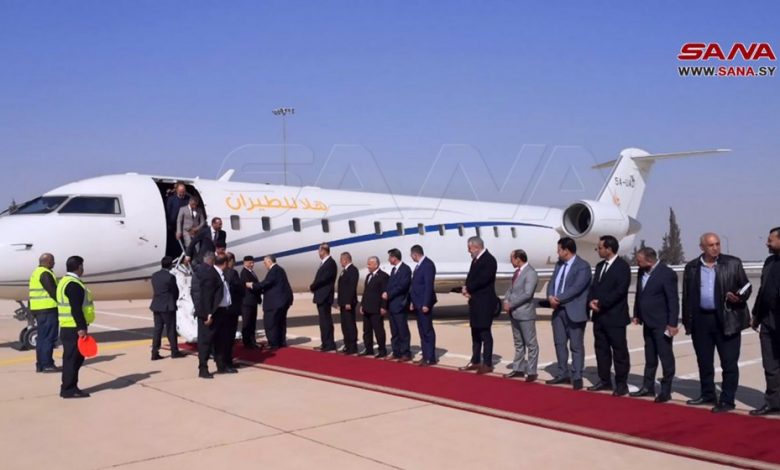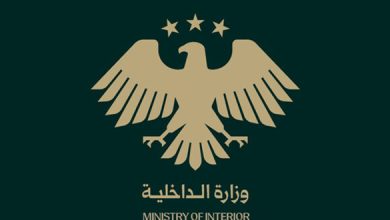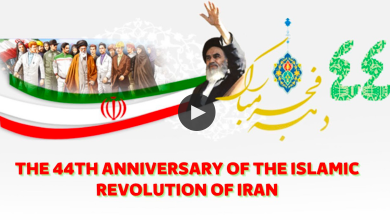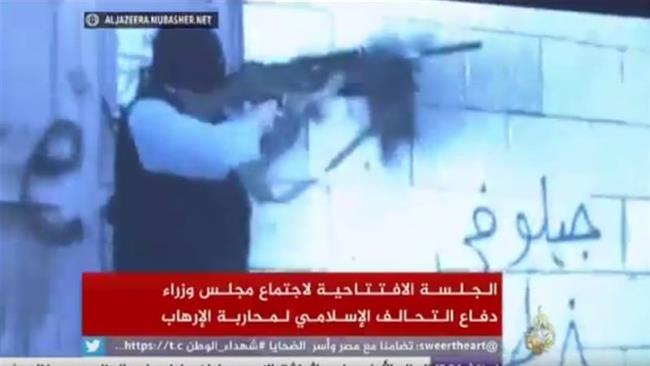Arab parliament speakers in Damascus amid efforts to reinstate Syria to Arab League
A number of Arab parliament speakers and senior legislators have arrived in Damascus, amid attempts by certain countries, above all Iraq, to restore Syria’s membership in the Arab League, more than a decade after it was suspended from the 22-member bloc.

The high-profile lawmakers landed at Damascus International Airport on Sunday and were officially received by Speaker of the People’s Assembly of Syria Hammouda Sabbagh.
“The atmosphere at the 34th conference of the Arab Inter-Parliamentary Union in the Iraqi capital city of Baghdad was very positive. It focused on unity among all Arab countries and underlined the need for Syria’s return to the Arab diplomatic fold,” Sabbagh told reporters.
He added that the visit also stresses the fact that Syria lies at the heart of any joint Arab action to confront current challenges and crises.
Calls to reinstate Syria to the Arab League are once again renewed after it had been suspended from the League following the start of the country’s foreign-sponsored conflict in 2011.
For his part, Speaker of Egypt’s House of Representatives Hanafy el-Gebaly said, “We are here in Damascus to show our support for the brotherly nation of Syria, and demonstrate our solidarity with it in the aftermath of the devastating [February 6] earthquake.”
“We are the same soul. We will stand by Syrians during the current difficult situation,” Gebaly noted.
On Saturday, Speaker of the Iraqi Council of Representatives Mohammed al-Halbousi called upon “all Arab countries, both at parliamentary and state levels, to adopt a final decision on Syria’s return to the Arab diplomatic fold.”
He urged Arab states to help worn-torn Syria perform its Arab, regional, and international role effectively, work diligently for the country’s stability and reconstruction of its badly damaged infrastructure, and assist Syrian refugees to return to their homeland.
“Syria is facing a difficult situation in the aftermath of the February 6, devastating earthquake, which claimed thousands of lives and caused severe damage to public and private properties. We should all assume our responsibilities and help Syria overcome the repercussions of the crisis,” Halbousi noted.
Jordanian Minister of Foreign Affairs and Expatriates Ayman Safadi also described it as necessary for Syria to return to the Arab League.
“Syria represents the history, glory, and civilization of the Arab world. Its sufferings have been exacerbated after the terrible earthquake disaster. This requires us to send more humanitarian aid to noble Syrians. We want Syria to act as an active and effective member of the Arab League in its decision-making,” Safadi said.
The Arab League suspended Syria’s membership in November 2011, citing an alleged crackdown by Damascus on opposition protests. Syria has denounced the move as “illegal and a violation of the organization’s charter.”
Syria was one of the six founding members of the Arab League in 1945. In recent months, an increasing number of countries and political parties have called for the reversal of its suspension from the Arab League.
Envoy: Syria-Oman joint economic commission to resume work in future
Meanwhile, Syria’s ambassador to Oman says the joint economic and trade commission between the two countries will resume its activities in the near future.
Idris Mayya said in a television interview that the sixth session of Oman-Syria joint economic commission will be held later this year in Muscat. “The meeting will focus on exploring available channels for further advancement of bilateral trade relations,” he said.
“The last time that Syria-Oman joint economic commission convened was in Damascus in 2010. It stopped its official activities following the outbreak of Syria conflict. Exchanges of economic, cultural and political delegations between the two countries, however, continued afterwards,” Mayya noted.
The Syrian diplomat went on to note that Omani Minister of Economy Said Mohammed al-Saqri will announce the date on which the sixth session of Oman-Syria joint economic commission will be held.
Last week, Syria’s President Bashar al-Assad visited Oman and met with Sultan Haitham bin Tariq Al Said following the devastating earthquake.
Syria’s official news agency SANA reported that Assad and Sultan Haitham held a face-to-face meeting at Beit al-Baraka royal palace in Seeb, near Muscat, where the Omani king offered his condolences to the Syrian government and nation over the natural calamity.
He also stressed his country’s unflinching support for Syria in order to help the country cope with the aftermath of the earthquake and repercussions of the foreign-sponsored militancy as well as the unilateral sanctions imposed by the West on Damascus.
For his part, Assad expressed his gratitude to the Omani monarch, authorities and people for their solidarity with Syria and delivery of humanitarian aid convoys. He also appreciated Oman’s support for Syria in the fight against Takfiri terrorists groups.
The talks between the two Arab leaders also focused on age-old relations between Muscat and Damascus, with special emphasis on expansion of bilateral ties in various fields and common areas of interest.
Oman was one of the few Arab states to maintain diplomatic ties with Damascus after the breakout of the foreign-backed militancy in the Arab country in March 2011, in spite of pressure from the United States and other Persian Gulf allies.
The country was also the first Persian Gulf state to reinstate its envoy to Syria in October 2020.
Deceased Syrian Foreign Minister Walid al-Muallem accepted the credentials of Oman’s Ambassador Turki bin Mahmood al-Busaidy, appointed to the post by royal decree in March that year.




